Table of Contents:
Remarkable and Esteemed Platoon Sergeant
In the waning days of November 1950, having been wounded on 27th September from a hand grenade and gunshot, I was transferred
from Tokyo Army Hospital to Ward 28, along with some other men who had convalesced sufficiently for Army standards to return to their parent unit. While in Ward 28, I curiously read
a headline in an edition of the Stars and Stripes, “Sergeant Uses Own Money to Get into Korean War”, and the interesting article that followed. After a seven-day leave in
Tokyo, I reported to Camp Drake. Two days later I boarded the USS Mitchell, a troop ship bound for Korea. The next day we arrived in the Yellow Sea, where the ship dropped
anchor. We ate our Thanksgiving dinner aboard the USS Mitchell. Late in the day an LST took us ashore at Inchon. We were trucked to our various units. The
25th Infantry Division Replacement Company was located in a schoolhouse in Yong-Dung-Po. The next day, we boarded railroad cattle-cars bound for the North Korean capitol,
Pyongyang, our first exposure to the coming Siberian winter. From Pyongyang I was taken to the 35th Infantry Headquarters, where I stayed with the cooks of C Company,
along with our Platoon Sergeant, Master Sergeant James R. “Pappy” Mills, who was recovering from pneumonia.
Late in the day I left with the cooks in search of C Company. We found them in the vicinity of Unsan/Yong-by-on. I located the
1st Platoon in a field. They were most happy to see me, shaking my hand and slapping me on the back. Many said they never expected to see me alive again. They
introduced me to the Platoon Sergeant, Master Sergeant Richard Pretzer, who was filling in for Pappy Mills. It dawned on me that this was the man I read about in the Stars and
Stripes newspaper while in Ward 28. It would be hard to find a better Platoon Sergeant than Pappy Mills in Eighth Army. Sergeant Pretzer, whom we sometimes just called
Pretzer, was a perfect fit to lead the 1st Platoon. He briefly mentioned he had served with the 78th Infantry Division in Germany, and later with the 25th
Infantry Division in the Far East during WWII.
In early June 1951, the 35th Infantry went into reserve, but an order came for B and C Companies to take Hill 1046. We left
the 1st Battalion and moved in behind our sister regiment, the 27th Infantry. The next day we climbed Hill 1046 to relieve the 24th Infantry Regiment
on the hill. An order came down from higher echelon to C Company for a platoon to move down the ridge and attack the enemy’s flank. Perhaps this would benefit the battalion
attacking in the valley. The order was assigned to the 1st Platoon. Sergeant Pretzer called for the squad leaders for a briefing and plan of attack. "Any questions?"
None. With a smile Pretzer said, “Scott, you have been so fortunate at guessing numbers, drawing straws, cutting cards for PX rations for your squad and mission assignments.
Your squad will lead the platoon in the attack.” I hastily told my squad our mission. We started down the rain-soaked, muddy ridge. The two scouts were fired upon making
contact with the enemy. I quickly ran over the hump and joined the two scouts. Then I proceeded to get my squad in position to engage the enemy. Pretzer came down right
behind my squad. I dashed back across the hump and joined him. He ran across the hump to estimate the situation before committing the platoon. When he returned across
the hump, he spoke to me, “One of those slope-heads got me.” Stunned, he sat down on the wet ground. I could not tell where he was hit, but noticed there was a hole in his
pack strap and later some blood in his saliva. I shouted for the medic, who came on the double. Upon examination, he had been shot by a machine gun as he ran back across the
hump. The radio man had our Company Commander, Captain Pannell, on the radio. I told him our situation. He said for us to execute a withdrawal. It was some time
before men bearing a stretcher arrived. My BAR Man, Paul Kaufman, was shot through the jaw and forearm. Once at the CP, the long journey off Hill 1046 began. We were
amazed at the calm, collected spirit Pretzer and Paul Kaufman possessed compared to a new replacement in my squad who shot himself in the foot. He was moaning, groaning and complaining
all the way down the hill during the night according to the medic and litter bearers.
As the men of the 1st Platoon meshed with Sergeant Pretzer, we realized he was a man of few words with a reserved, quiet, easy-going
disposition about his service or achievements. But he exhibited genuine comradery as a member of the platoon who shared and sacrificed in the actions and fortunes of the platoon
and foremost as an infantry leader.
A few days after Hill 1046 I went on rest leave to Japan. First call was to Tokyo Army Hospital to see if Pretzer was there.
We had a good visit. He was leaving for the States at anytime, so I wished him the best and carried his messages back to the men of our platoon. Master Sergeant Mills and Pretzer
were exemplary leaders with the ultimate concern for the men of the 1st Platoon.
After I returned to the States and left the Army, my many attempts to contact Pretzer failed. In January 2016, I had my daughter try
to locate a Pretzer in San Francisco using the Internet. A Donald Pretzer appeared. I wrote him a letter in hopes he was at least next of kin. A few days later I received a
letter from Mary E. Gibbs dated January 16th. Donald had forwarded my letter to his sister, Mary. Richard was their brother, as well as Theodore. They were
the daughter and sons of this amazing family, Mr. and Mrs. Theodore R. Pretzer of South San Francisco. She enclosed many copies of newspaper clippings, photographs and army records.
I immediately called Mary and we had a long, interesting, and informative conversation. Donald called me and we talked about our service in Korea.
The father, Theodore Pretzer, Sr. served in WWI and WWII. Two of their sons, Theodore and Richard, enlisted when underage and served
in the Army in WWII. All three sons served and were wounded in the Korean War. Sergeant Theodore was wounded on February 10th, 1951, while serving with the 7th
Infantry Regiment, 3rd Infantry Division. Master Sergeant Richard was wounded on June 4th, 1951, while serving in the 1st Platoon, C Company, 35th
Infantry Regiment, 25th Infantry Division. Sergeant Donald was wounded on October 6th, 1951, while serving with the 13th Artillery Battalion, 24th
Infantry Division.
I am indeed grateful for the touching letter from Mary, along with the newspaper clippings and army records. In her letter she wrote,
“When he returned from Vietnam, he retired from the military and went to work for Edward Wire Rope Company in So. San Francisco, CA. He lived with my father in the family home there.
He never married, but had three dogs and a cat to look after, along with the care of my elderly father. This kept him very busy. As Richard progressed in age, my husband and
I were in charge of his care. Actually, Richard did very well with his illness and his passing was not a long suffering experience, much like you describe his being wounded in Korea.
I say he bore his illness with dignity.”
Mary also related that each day after attending high school, she would visit her brothers, Ted and Richard, in Letterman Hospital in San
Francisco. She said the machine gun bullets not only pierced Richard’s left lung as I thought, but also nicked his heart and left elbow.
I have told Richard’s story many times--how he paid his way from Germany to fight with his old outfit, the 25th Infantry Division.
Hopefully this time it is told to a wider audience, and most of all for a deeper appreciation of the Pretzer family for the commitment and sacrifices they made. Richard once told
his mother that he was a “born soldier.” His awards and decorations are numerous. Among them, the Bronze Star Medal with “V” Device (Second Oak Leaf Cluster), Silver Star (Third
Oak Leaf Cluster), Purple Heart (One Oak Leaf Cluster) and Air Medal, to name a few. He was also awarded a battlefield commission to 1st Lieutenant in the Army of the
United States by the President of the United States in 1954.
Richard was awarded the Bronze Star while serving with the 78th Infantry Division in Germany. The report stated he was seventeen
years old and had been in the Army three years when he received the Bronze Star.
The following report by his superiors reflects his manner of performance:
“While serving in the Republic of Viet Nam, 1SG Pretzer has depicted himself as the finest first sergeant I have ever encountered.
His standards are beyond reproach. Every task assigned him is done to the highest military standards. He possesses a phenomenal amount of drive and is constantly seeking
to improve the standards of his subordinates through persuasive leadership. His caliber of standards and achievements are unequalled by any NCO with whom I have ever worked.
His physical condition and military bearing are of such standards that other NCOs would do well to emulate him. 1SG Pretzer is the most proficient 1SG I have encountered.”
Richard passed away on 4 July 2012. Speaking for myself and the men of the 1st Platoon of C Company, 1st Battalion,
35th Infantry Regiment, 25th Infantry Division, it was an honor and pleasure to serve with our remarkable, esteemed Platoon Sergeant, Master Sergeant Richard Roy
Pretzer 1950-51. Richard will long be remembered by his men for his expeditious proficiency and professionalism, and for being the very epitome of military leadership in combat.
Charles C. Scott
PO Box 275
Beckley, WV 25801-0275
Back to Page Contents
Spokane Daily Chronicle Article
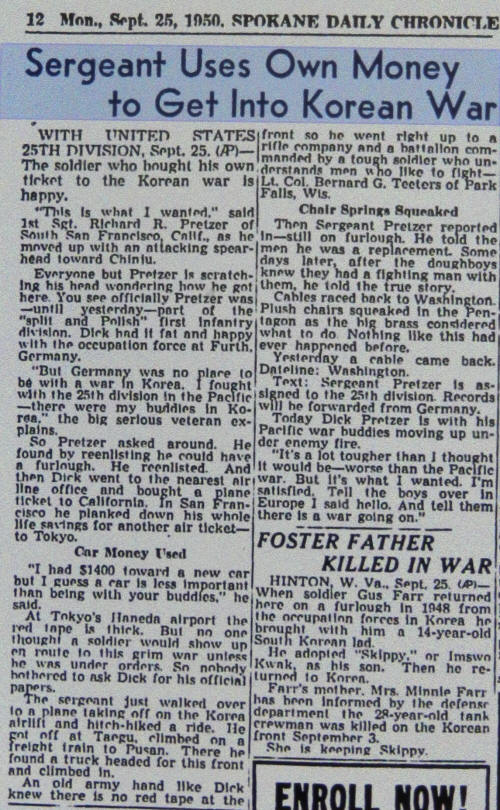
Back to Page Contents
Story Behind the Article
The following clipping, written by Herb Caen, columnist for the San Francisco Chronicle for almost fifty years,
is the story behind the article. Richard did not tell his parents what his plan was when he took leave from Germany and returned home. His youngest brother, Donald, knew that
Richard had purchased a ticket to Korea, flying out of San Francisco International airport. When he made it to the front lines in Korea, a reporter covering the “police action” (as
it was called then) contacted Herb Caen. Caen’s assistant called the Pretzer home in South San Francisco, California, and spoke with Mrs. Pretzer, Richard’s mother who was in complete
shock hearing that Richard was on the “front lines” when she thought he was in Germany. It was Herb Caen’s article that started this news coverage. The Army transferred Richard’s
records to the appropriate Army contacts and he was not written up as AWOL. Richard’s comment in the last line is blurred. It reads: “The car can wait,” he said, “This
can’t.”
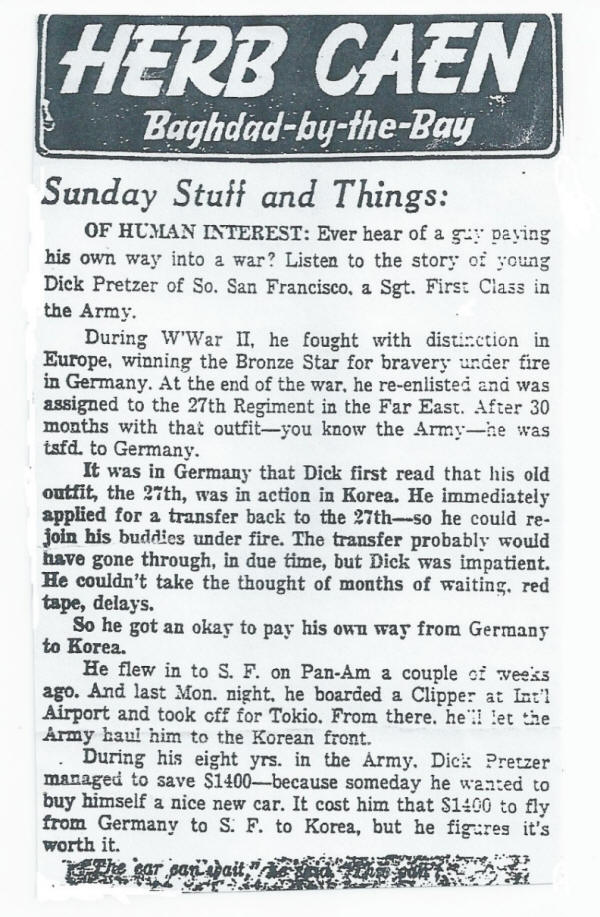
Back to Page Contents
Display of Patriotism
On July 31st, 1951, the Secretary of the Army wrote a commendation to the Pretzer family for their outstanding
display of patriotism. Mary enclosed it with her letter.
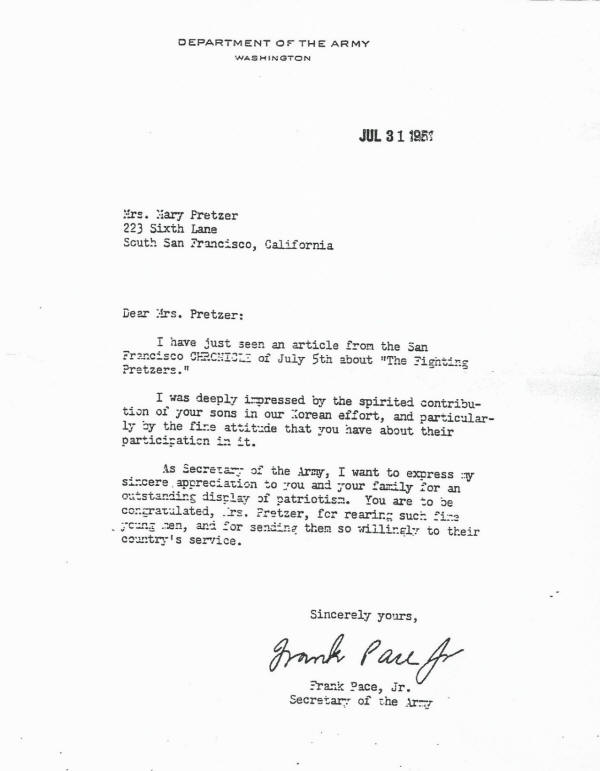
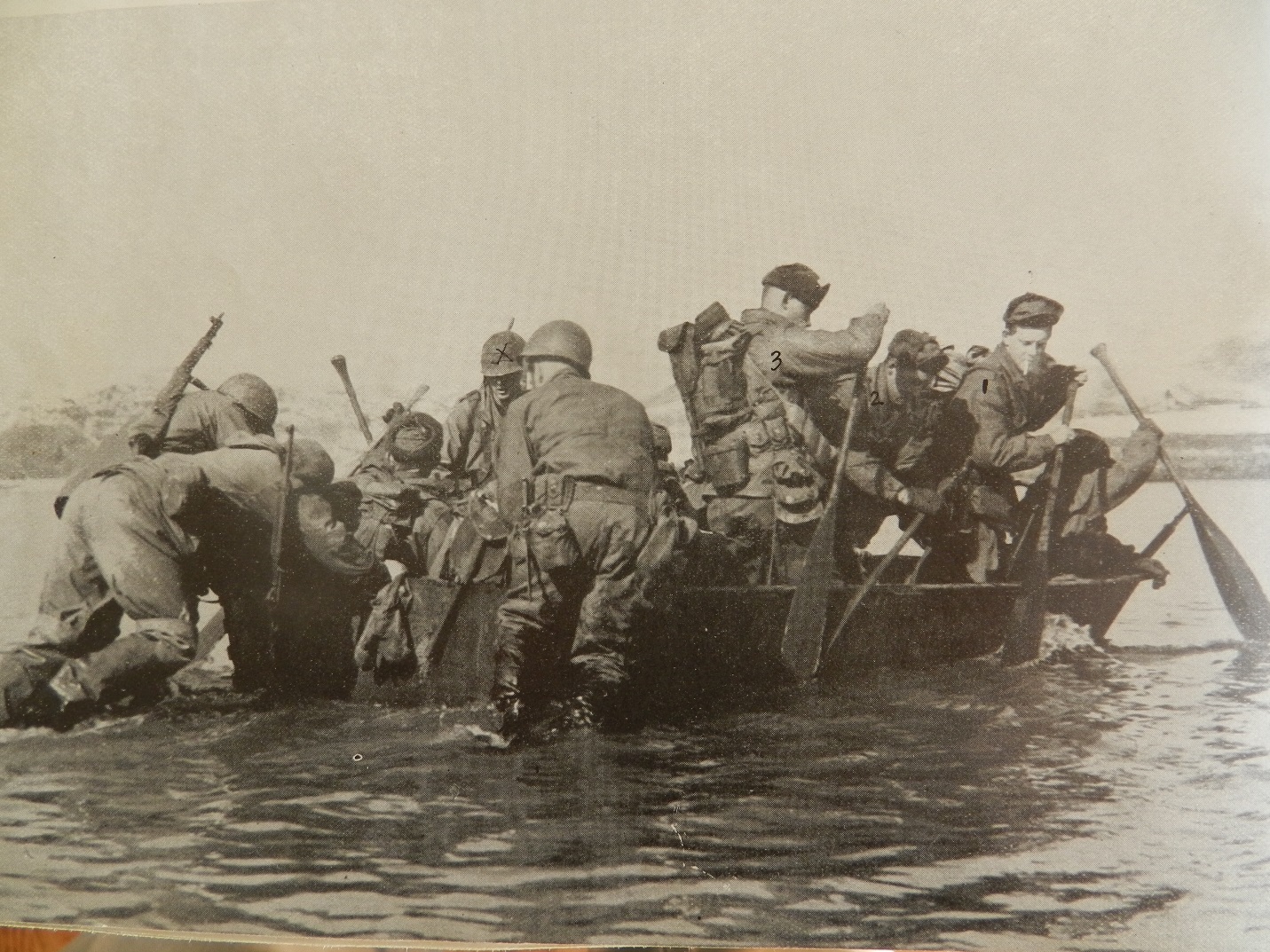
Standing from R-L Doc – Medic, Mitchell Longley, Platoon Sergeant Pretzer
in engineering boat crossing the Han River, March 7th, 1951
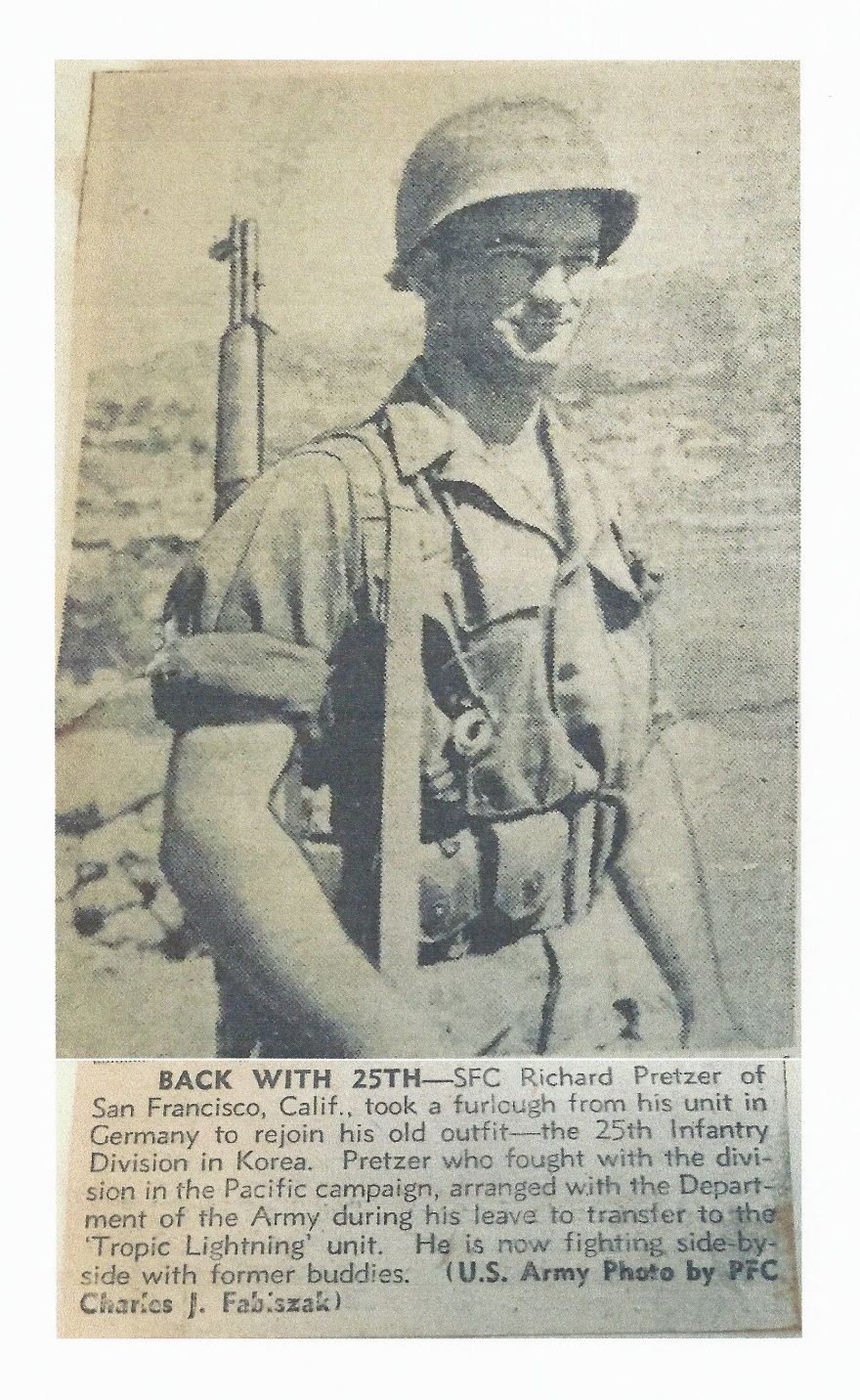
|




